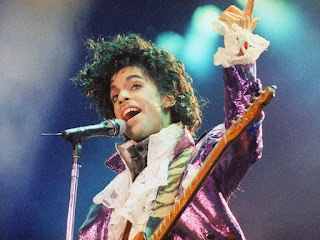The singer Prince, who has died aged 57 at his home in Minnesota, drew on a number of musical genres as sources of inspiration.
The son of a jazz musician, I'd guess he was influenced by that, as well as by funk and rock (his stage act always reminded me a bit of Jimi Hendrix's). As a teenager in the mid-80's, his songs were everywhere and appealed to me more than those of his contemporary and fellow African-American singer Michael Jackson who I always found overly produced and commercial.
It's interesting how American popular music gets categorised, firstly by skin colour, with black performers tending to be called rhythm and blues artists when they'd be classed as rock or pop if they were white, and also African-American music itself, which is somewhat arbitrarily divided, generally by white critics, into secular (blues, jazz, soul, R&B) and religious music (spirituals, gospel), despite numerous artists spanning those sub-sets, including Ray Charles, Nina Simone, Etta James, Sister Rosetta Tharp and Aretha Franklin. There are also many examples of people from one genre influencing another, with clear similarities (and claims of plagiarism) between soul singer James Brown and blues harpist Junior Wells, and fusions such as soul-blues and jazz-rock.
One of the funniest things I've ever read are the liner notes to Muddy Waters' Folk Singer album in which the producer Ralph Bass muses as to whether Perry Como is a soul singer!

It's interesting that in the 1950s, the music of crossover black performers such as Little Richard and Chuck Berry was called rock & roll, but where the artists still appealed to mainly black audiences, it was called rhythm and blues. It was basically the same music.
ReplyDeleteThe music scene is riddled with people intent on over-classifying to the Nth degree, partly because it makes them sound knowledgeable and discerning. Musicians don't generally go in for this nonsense, just fans and people who make money out of over-intellectualising.